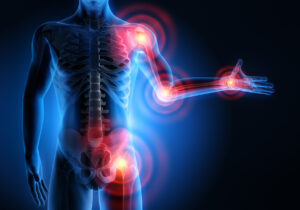
Older siblings and childhood tonsil removal linked to heightened risk of inflammatory arthritis
Strengthens theory that childhood infections influence ankylosing spondylitis development
Having older siblings and childhood tonsil removal are linked to a heightened risk of ankylosing spondylitis, a type of chronic inflammatory arthritis, finds a large study published in the open access journal RMD Open.
The findings lend weight to the theory that childhood infections have a role in the development of the condition, which is characterised by inflammation of the spine, joints, and tendons, resulting in pain, stiffness, and fatigue.
While genetic predisposition is the leading cause of the disease, early life environmental factors are also thought to have a role.
To explore this further, the researchers drew on health and family unit information contained in national Swedish population registries to compare exposure to various early life risk factors in adults with and without the condition.
To qualify for inclusion in the case-control analysis, cases had to have had at least one inpatient or outpatient specialist clinic visit with a recorded diagnosis of ankylosing spondylitis between January 2001 and December 2022.
Each case was matched for sex, year of birth, and region of residence with an average of 4 members of the general public who didn’t have the disease.
Early life risk factors included: mother’s age at delivery, her weight (BMI) in early pregnancy, and whether she smoked; length of pregnancy; baby’s birthweight; multiple birth; Caesarean section delivery; maternal infections during pregnancy; and season of birth.
Other factors considered were number of siblings; serious childhood infections from birth up to the age of 15; and tonsil and/or appendix removal before the age of 16.
In all, 6771 people born from 1973 onwards were diagnosed with ankylosing spondylitis between 2001 and 2022. Of these, 5612 were born in Sweden and were selected as the cases.
Several factors were associated with a heightened risk of an ankylosing spondylitis diagnosis, among them having just one or more older siblings (12-15% heightened risk), but not siblings in general.
Serious childhood infections were associated with a 13% heightened risk after accounting for potentially influential factors, while tonsil removal before the age of 16 was associated with a 30% heightened risk.
Multiple birth, as opposed to singleton birth, was associated with a 23% heightened risk, while being born in the summer or autumn months was associated with a significantly lower risk than being born in the winter.
The researchers then carried out a sibling comparison analysis—3965 with, and 6070 siblings without, the disease as this adjusts for potentially influential measured and unmeasured environmental factors shared within families.
This analysis indicated an 18% heightened risk for one older sibling compared with none, rising to a 34% for two or more older siblings, after adjustment for sex, mother’s age, and year of birth.
“The mechanism behind this risk increase cannot be determined from our data, but it has been shown that infants with older siblings are more exposed to infections early in life than infants without siblings,” explain the researchers.
While the association with serious childhood infections observed in the case–control analysis fell to a 4% heightened risk, the association with tonsil removal rose to a 36% heightened risk after adjusting for potentially influential factors.
This is an observational study, and as such, can’t establish cause. The researchers didn’t have access to family doctor data, so serious infections were identified from hospital records and tonsil removal only, and only those born after 1973 were included in the study.
Nevertheless, the researchers conclude: “Having older siblings and a history of tonsillectomy in childhood were independently associated with development of [ankylosing spondylitis], even after adjustment for family shared factors in a sibling comparison analysis. This strengthens the hypothesis that childhood infections play a role in the aetiology of [the condition].”
17/10/2023
Notes for editors
Research: Association of childhood infections and perinatal factors with ankylosing spondylitis: a Swedish nationwide case– control and sibling study doi 10.1136/rmdopen-2023-003438
Journal: RMD Open
Funding: Swedish Research Council; Swedish Rheumatism Association
Link to Academy of Medical Sciences press release labelling system
http://press.psprings.co.uk/
Externally peer reviewed? Yes
Evidence type: Observational; case-control study
Subjects: People





